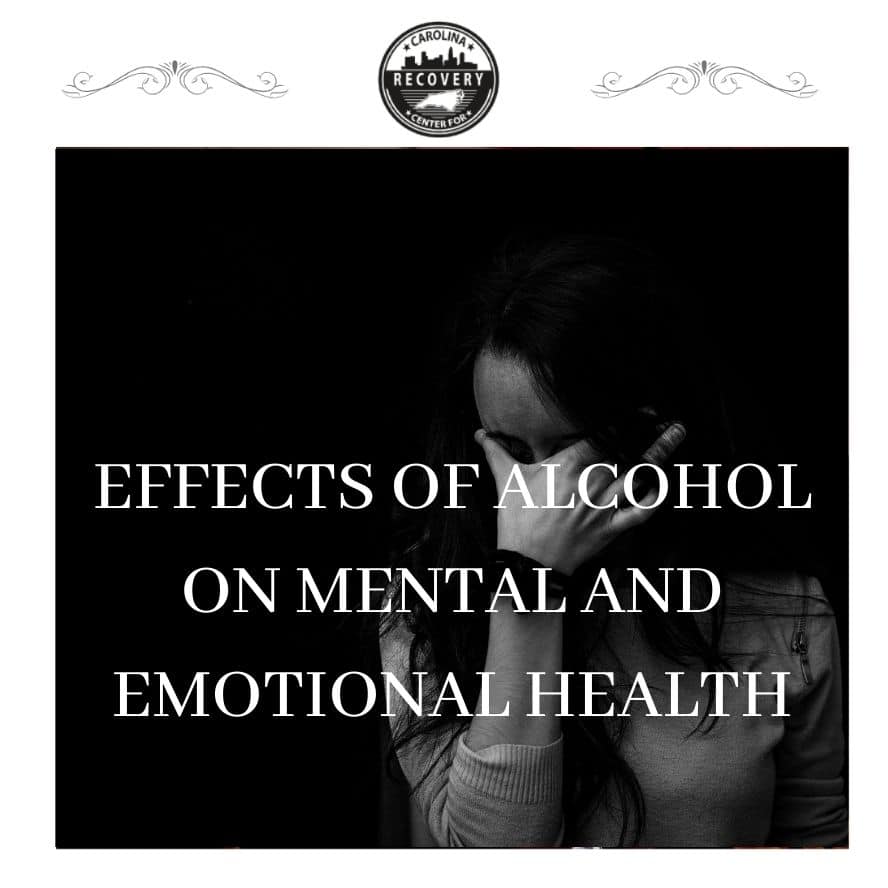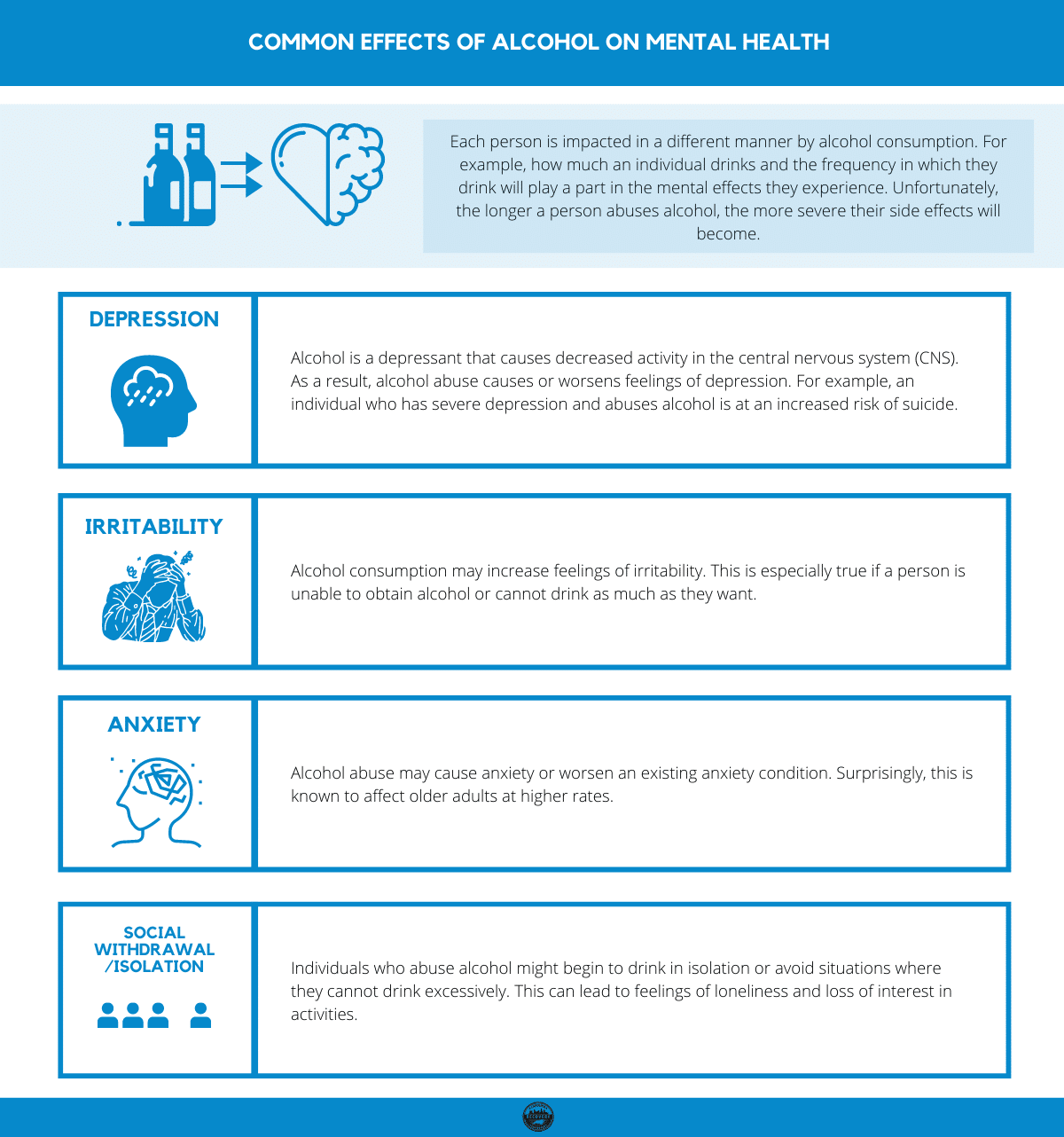The Effects of Alcohol on Emotional and Mental Health

Medically Verified: 2/1/24
Medical Reviewer
Chief Editor

All of the information on this page has been reviewed and verified by a certified addiction professional.
Alcohol has become one of America’s favorite pastimes. In other words, many Americans partake in alcohol consumption on a regular basis, sometimes to the point of abuse. Alcohol abuse is dangerous, as it may cause a variety of negative side effects. Some of the most common side effects of frequent or consistent alcohol abuse include negative impacts on one’s emotional and mental health, such as alcoholic mood swings or the worsening of mental health conditions. In addition, alcohol is known to negatively impact cognitive functions, such as a loss of inhibitions, confused or abnormal thinking, and poor decision-making. In the long term, the effects of alcohol on mental health can be extremely damaging.
While recreational users typically recover from the short-term side effects of alcohol, they may continue to suffer from the mental and emotional effects of drinking. If you or a loved one frequently abuse alcohol, it may be time to consider attending an alcohol rehab near you.
Effects of Alcohol on Mental Health

Each person is impacted in a different manner by alcohol consumption. For example, how much an individual drinks and the frequency in which they drink will play a part in the mental effects they experience. Unfortunately, the longer a person abuses alcohol, the more severe their side effects will become.
The most common effects of alcohol on mental health include:
- Depression — Alcohol is a depressant that causes decreased activity in the central nervous system (CNS). As a result, alcohol abuse causes or worsens feelings of depression. For example, an individual who has severe depression and abuses alcohol is at an increased risk of suicide.
- Irritability — Alcohol consumption may increase feelings of irritability. This is especially true if a person is unable to obtain alcohol or cannot drink as much as they want.
- Anxiety — Alcohol abuse may cause anxiety or worsen an existing anxiety condition. Surprisingly, this is known to affect older adults at higher rates.
- Social Withdrawal/Isolation — Individuals who abuse alcohol might begin to drink in isolation or avoid situations where they cannot drink excessively. This can lead to feelings of loneliness and loss of interest in activities.
Individuals who suffer from pre-existing mental health conditions may experience a worsening in symptoms when they drink excessively. For example, individuals suffering from anxiety, depression, bipolar, or other mood disorders should not drink in excess, as alcohol worsens these conditions.
Individuals who become addicted to alcohol while suffering from a pre-existing mental health condition are known as dual diagnosis. In other words, they suffer from alcohol use disorder (AUD) as well as a co-occurring mental health condition. Oftentimes, co-occurring disorders make recovery much more difficult and complex. However, dual diagnosis treatment centers are trained and qualified to treat both conditions simultaneously, providing patients with a solid foundation of recovery. If you or a loved are experiencing mental or emotional effects as a result of your drinking, it may be time to consider attending a dual diagnosis treatment center.
Emotional Effects of Drinking
When an individual drinks excessively, it is likely that they will experience damage to the cerebellum in their brain. The cerebellum is the most sensitive area of the brain to alcohol abuse because it controls functions such as memories and emotions. When an individual drinks alcohol, their body begins to create an increased amount of serotonin and endorphins. Serotonin and endorphins are chemicals responsible for regulating our emotions, sense of relaxation, and happiness. In other words, the more an individual drinks, the more vulnerable their brain becomes to the effects of alcohol, potentially having a negative impact on their emotional and mood regulation. This is why the emotional effects of drinking are so pronounced, and compiled with the effects of alcohol on mental health, quitting an alcohol problem can be extremely difficult.
Here are a few of the ways problem drinking affects people’s emotional well-being.
Drinking to Avoid Pain
The emotions and moods affected by alcohol consumption typically include a mixture of painful, happy, or relaxed feelings. When an individual begins to abuse alcohol to soothe painful feelings, they are usually attempting to overcome emotions of fear, hurt, sadness, grief, jealousy, shame, embarrassment, guilt, or loneliness.
Consuming Alcohol to Achieve Happiness
On the other hand, some individuals may be abusing alcohol to achieve artificial feelings of happiness, such as feelings of delight, thrill, general excitement, self-esteem, confidence, and connection or belonging in social situations.
Drinking to Relax or Calm Down
Lastly, some people may drink alcohol to achieve a relaxed state of emotional calm, including comfort, lack of concern about problems, and emotional numbness.
Unfortunately, individuals who drink alcohol to numb their feelings, or self-medicate, typically experience a worsening in symptoms. This is because of the effect alcohol has on the cerebral cortex of the brain and on mental health. Excessive alcohol consumption makes it difficult for an individual to think clearly and depresses an individual’s behavioral inhibitory centers. As a result, the intoxicated person will be less inhibited and experience poor judgment, often leading to negative legal or social repercussions.
Drinking in excess is known to cause severe disruption in personal relationships and among families. Unfortunately, intoxicated individuals experience raw and unreliable emotions, often resulting in anger, bouts of hysteria, crying jags, or even physical or verbal abuse. As a result, the individual’s friends, family members, or partner may begin to avoid them out of fear or unwillingness to accept their emotional outbursts. If you or a loved one suffer from the emotional effects of drinking, it may be time to consider attending professional alcohol addiction treatment.
Attend an Alcohol Rehab Near You
At Carolina Recovery Center, we understand the negative impacts alcohol abuse has on emotional and mental health. Because of this, we employ only the most qualified and experienced therapists and mental health specialists. Our team of highly-supportive staff will be there to educate you on alcoholism and provide you with the tools needed to recover. Between helping you reverse the negative effects of alcohol on your mental health to improving your emotional well-being, we’re here to help. Contact us for more information on how to get started today!

